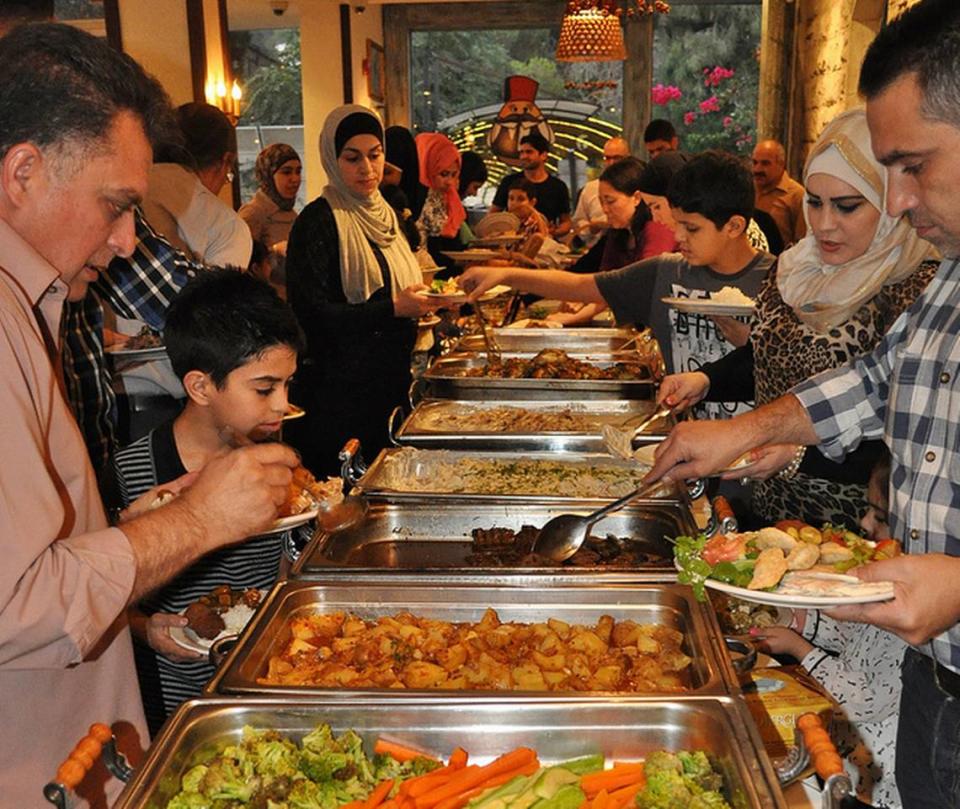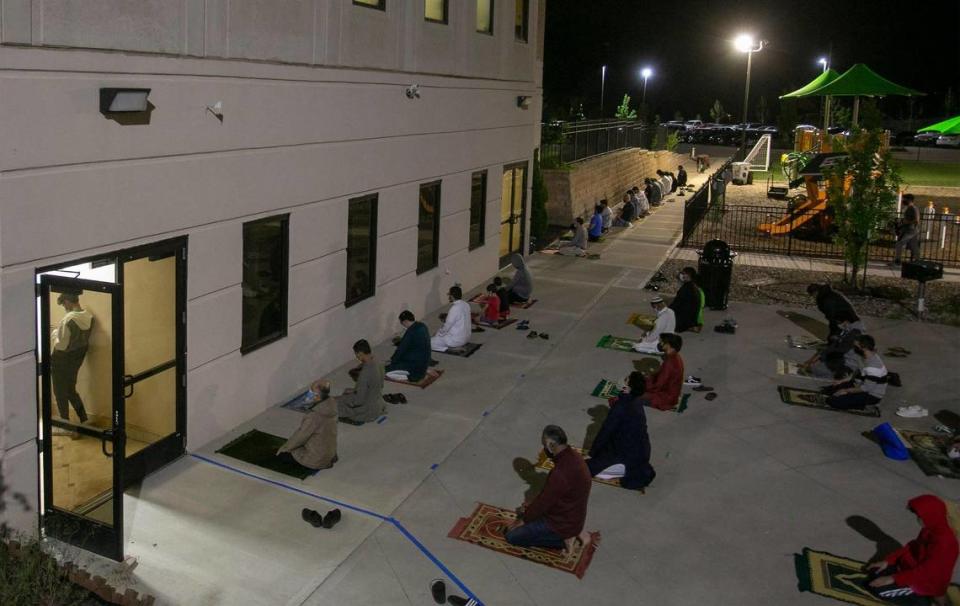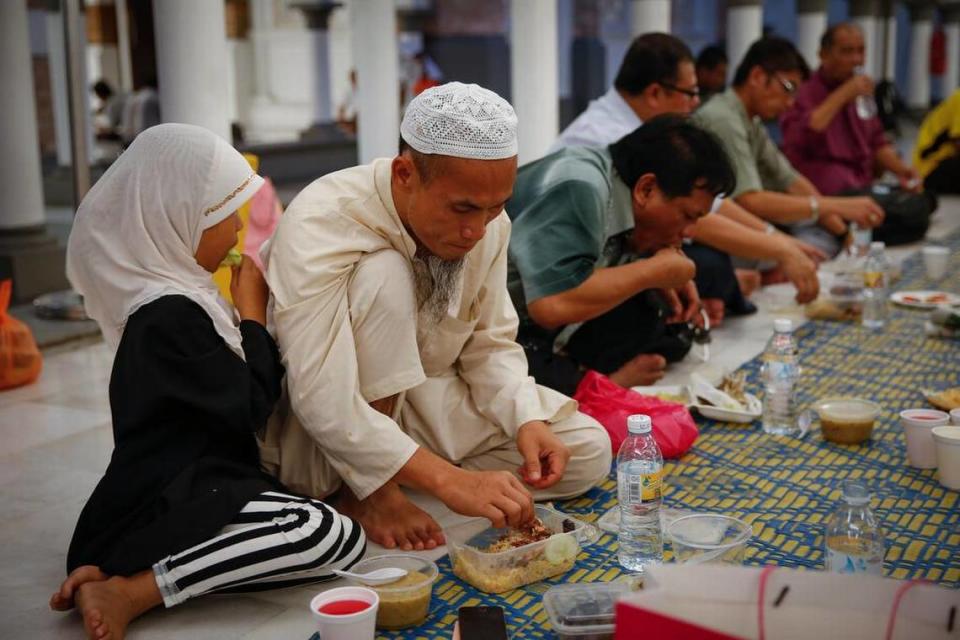How Muslims in Dallas-Fort Worth are observing Ramadan — a month of worship and charity
More than 420,000 Muslim Texans have started fasting from dawn to dusk for the holy month of Ramadan.
Ramadan is the most important month to Muslims, acting as a time of spiritual cleansing. The ninth month of the Islamic calendar is marked by reflection, worship, charity and community.
Muslims get together to break their fast, gather at the mosque for prayer and Quran recitation every night and drape their homes with crescent and lantern decorations.
Here’s what you need to know about Ramadan.
When is Ramadan?
Ramadan fluctuates each year based on the lunar Islamic calendar, which follows the phases of the moon. This year, Muslims started fasting for Ramadan on Thursday, March 23. The last day will be Thursday, April 20.
What does Ramadan fasting look like?
Fasting during Ramadan is one of the five pillars of Islam, along with prayer, profession of faith, charity and pilgrimage. Healthy Muslim adults abstain from all food, drink (including water) and sexual activity from dawn to dusk, eating a meal before the fast and another to break it.
Suhoor is the meal Muslims have early in the morning, around 5 a.m., before fasting for the day.

The sunset meal to break the fast, around 8 p.m., is called iftar. Dates are an important part of the iftar table. Often, Muslims gather with family, relatives, friends or their local community for the meal. The meal tends to have several courses, including special dishes and sweets.
Every Muslim that has reached puberty, and is physically able, fasts. Muslims are exempt from fasting if they are pregnant, nursing, menstruating or ill.
How many in DFW observe Ramadan?
An estimated 1.68% of the Texas population is Muslim, making it the fifth largest religious group in the state and first in the nation in number of Muslims, according to the Texas Almanac.
About 30,000 Muslims call Dallas home. The Muslim population is about 4,000 in Fort Worth and 3,000 in Arlington.
Dallas-Fort Worth Muslims congregate at the 72 mosques and 12 prayer spaces in the metroplex.
Why is Ramadan observed?
For Muslims, Ramadan is the month when the Quran, the Muslim holy book, was first revealed to the Prophet Muhammed.
The key purpose of Ramadan is to get closer to God. It’s also a time to feel gratitude, practice self-restraint, empathize with the less fortunate and reduce distractions to focus on religion.
How to wish someone a happy Ramadan
There are two main Ramadan greetings:
Ramadan Mubarak: Mubarak means “blessed” in Arabic, so you are essentially saying, “Have a blessed Ramadan.”
Ramadan Kareem: Kareem is “generous” in Arabic, so you’d be wishing them a generous Ramadan.
What is taraweeh?
After breaking their fast, Muslims perform taraweeh nightly prayers, in addition to the five regular prayers. “Taraweeh” derives from the Arabic word meaning to rest and relax.
The five daily prayers include: Fajr (sunrise prayer), Dhuhr (noon prayer), Asr (afternoon prayer), Maghrib (sunset prayer) and Isha (night prayer). After Isha, Muslims congregate at home or their local mosque for taraweeh that lasts about one to two hours, during which large portions of the Quran are recited.

The last 10 nights of Ramadan are believed to be the most important opportunities for worship during the holy month. One of those nights, known as Laylat-al-Qadr or the “Night of Power,” is considered to be the Islamic calendar’s holiest eve.
How else do Muslims observe Ramadan?
Along with prayer, there are other ways Muslims worship during Ramadan, devoting the month to focusing on their relationship with God. Muslims work on increasing their good deeds by helping others and acting kindly, and avoiding negative actions like lying and gossiping.
Reading the Quran, the religious text of Islam, is one of the main components of Ramadan. Many Muslims aim to read all 604 pages of the holy book by the end of the month. Throughout the day, Muslims also recite dhikr, remembrance of God, and duaa, supplications.
One of the virtues of Ramadan is giving, which is why Muslims donate to various charities as well as share gifts and food with others. Many mosques hold food drives, charity fundraisers and open houses for neighbors of other faiths during Ramadan.
What is Eid al-Fitr?
Eil al-Fitr, the first of two Muslim holidays, marks the end of Ramadan. It translates to “the Festival of Fast-breaking.”

This year, it falls on Friday, April 21. Muslims wear their best fits, attend morning Eid prayer and gather for festivities and gift-giving.

 Yahoo Movies
Yahoo Movies 